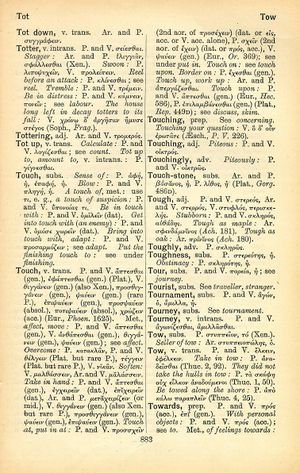touch: Difference between revisions
Θησαυρός ἐστι τῶν κακῶν κακὴ γυνή → Ingens mali thesaurus est mulier mala → Ein Schatz an allem Schlechten ist ein schlechtes Weib
m (Text replacement - "<b class="b2">Hec.</b>" to "''Hec.''") |
m (Woodhouse1 replacement) |
||
| Line 1: | Line 1: | ||
{{Woodhouse1 | {{Woodhouse1 | ||
|Text=[[File:woodhouse_883.jpg|thumb|link={{filepath:woodhouse_883.jpg}}]] | |Text=[[File:woodhouse_883.jpg|thumb|link={{filepath:woodhouse_883.jpg}}]] | ||
===substantive=== | |||
[[sense of]]: [[prose|P.]] [[ἁφή]], ἡ, [[ἐπαφή]], ἡ. | |||
[[blow]]: [[prose|P.]] and [[verse|V.]] [[πληγή]], ἡ. | |||
[[a touch of]], met.: use [[τι]], e.g., [[a touch of suspicion]]: [[prose|P.]] and [[verse|V.]] [[ὑπονοίας τι]]. | |||
[[be in touch with]]: [[prose|P.]] and [[verse|V.]] [[ὁμιλεῖν]] (dat.). | |||
[[get into touch with]] (an [[enemy]]): [[prose|P.]] and [[verse|V.]] [[ὁμόσε χωρεῖν]] (dat.). | |||
[[bring into touch with]], [[adapt]]: [[prose|P.]] and [[verse|V.]] [[προσαρμόζειν]]; see [[adapt]]. | |||
[[put the finishing touch to]]: see under [[finishing]]. | |||
===verb transitive=== | |||
P. and V. ἅπτεσθαι (gen.), ἐφάπτεσθαι (gen.) ( | [[prose|P.]] and [[verse|V.]] [[ἅπτεσθαι]] (gen.), [[ἐφάπτεσθαι]] (gen.) ([[Plato]]), [[verse|V.]] [[θιγγάνειν]] (gen.) (also [[Xenophon|Xen.]]), [[προσθιγγάνειν]] (gen.), [[ψαύειν]] (gen.) (rare [[prose|P.]]), [[ἐπιψαύειν]] (gen.), [[προσψαύειν]] (absol.), [[ποτιψαύειν]] (absol.), [[χρώζειν]] (acc.) ([[Euripides|Eur.]], ''[[Phoenissae]]'' 1625). | ||
Met., | Met., [[affect]], [[move]]: [[prose|P.]] and [[verse|V.]] [[ἅπτεσθαι]] (gen.), [[verse|V.]] [[ἀνθάπτεσθαι]] (gen.), [[θιγγάνειν]] (gen.), [[ψαύειν]] (gen.); see [[affect]]. | ||
[[overcome]]: [[prose|P.]] [[κατακλᾶν]], [[prose|P.]] and [[verse|V.]] [[θέλγειν]] ([[Plato]] but rare [[prose|P.]]), [[τέγγειν]] ([[Plato]] but rare [[prose|P.]]), [[verse|V.]] [[νικᾶν]]. | |||
[[soften]]: [[verse|V.]] [[μαλθάσσειν]], [[Aristophanes|Ar.]] and [[verse|V.]] [[μαλάσσειν]]. | |||
[[take in hand]]: [[prose|P.]] and [[verse|V.]] [[ἅπτεσθαι]] (gen.), [[ἐγχειρεῖν]] (dat.), [[ἐπιχειρεῖν]] (dat.). [[Aristophanes|Ar.]] and [[prose|P.]] [[μεταχειρίζειν]] (or mid.). [[verse|V.]] [[θιγγάνειν]] (gen.) (also [[Xenophon|Xen.]] but rare [[prose|P.]]), [[προσθιγγάνειν]] (gen.), [[ψαύειν]] (gen.), [[ἐπιψαύειν]] (gen.). | |||
[[touch at]], [[put in at]]: [[prose|P.]] and [[verse|V.]] [[προσσχεῖν]] (2nd aor. of [[προσέχειν]]) (dat. or [[εἰς]], acc. or [[verse|V.]] acc. alone). [[prose|P.]] [[σχεῖν]] (2nd aor. of [[ἔχειν]]) (dat. or [[πρός]]. acc.), [[verse|V.]] [[ψαύειν]] (gen.) ([[Euripides|Eur.]], ''[[Orestes]]'' 369); see under [[put in]]. | |||
[[touch on]]: see [[touch upon]]. | |||
[[border on]]: [[prose|P.]] [[ἔχεσθαι]] (gen.). | |||
[[touch up]], [[work up]]: [[Aristophanes|Ar.]] and [[prose|P.]] [[ἀπεργάζεσθαι]]. | |||
[[touch upon]]: [[prose|P.]] and [[verse|V.]] [[ἅπτεσθαι]] (gen.) ([[Euripides|Eur.]] ''[[Hecuba]]'' 586). [[prose|P.]] [[ἐπιλαμβάνεσθαι]] (gen.) ([[Plato]], ''[[Republic]]'' 449D); see [[discuss]], [[skim]]. | |||
}} | }} | ||
Revision as of 08:49, 20 May 2020
English > Greek (Woodhouse)
substantive
sense of: P. ἁφή, ἡ, ἐπαφή, ἡ.
a touch of, met.: use τι, e.g., a touch of suspicion: P. and V. ὑπονοίας τι.
be in touch with: P. and V. ὁμιλεῖν (dat.).
get into touch with (an enemy): P. and V. ὁμόσε χωρεῖν (dat.).
bring into touch with, adapt: P. and V. προσαρμόζειν; see adapt.
put the finishing touch to: see under finishing.
verb transitive
P. and V. ἅπτεσθαι (gen.), ἐφάπτεσθαι (gen.) (Plato), V. θιγγάνειν (gen.) (also Xen.), προσθιγγάνειν (gen.), ψαύειν (gen.) (rare P.), ἐπιψαύειν (gen.), προσψαύειν (absol.), ποτιψαύειν (absol.), χρώζειν (acc.) (Eur., Phoenissae 1625).
Met., affect, move: P. and V. ἅπτεσθαι (gen.), V. ἀνθάπτεσθαι (gen.), θιγγάνειν (gen.), ψαύειν (gen.); see affect.
overcome: P. κατακλᾶν, P. and V. θέλγειν (Plato but rare P.), τέγγειν (Plato but rare P.), V. νικᾶν.
soften: V. μαλθάσσειν, Ar. and V. μαλάσσειν.
take in hand: P. and V. ἅπτεσθαι (gen.), ἐγχειρεῖν (dat.), ἐπιχειρεῖν (dat.). Ar. and P. μεταχειρίζειν (or mid.). V. θιγγάνειν (gen.) (also Xen. but rare P.), προσθιγγάνειν (gen.), ψαύειν (gen.), ἐπιψαύειν (gen.).
touch at, put in at: P. and V. προσσχεῖν (2nd aor. of προσέχειν) (dat. or εἰς, acc. or V. acc. alone). P. σχεῖν (2nd aor. of ἔχειν) (dat. or πρός. acc.), V. ψαύειν (gen.) (Eur., Orestes 369); see under put in.
touch on: see touch upon.
touch up, work up: Ar. and P. ἀπεργάζεσθαι.
touch upon: P. and V. ἅπτεσθαι (gen.) (Eur. Hecuba 586). P. ἐπιλαμβάνεσθαι (gen.) (Plato, Republic 449D); see discuss, skim.

